- Home
- Tad Williams
To Green Angel Tower, Volume 1 Page 2
To Green Angel Tower, Volume 1 Read online
Page 2
Synopsis of Stone of Farewell
Simon, the Sitha Jiriki, and soldier Haestan are honored guests in the mountaintop city of the diminutive Qanuc trolls. But Sludig—whose Rimmersgard folk are the Qanuc’s ancient enemies—and Simon’s troll friend Binabik are not so well treated; Binabik’s people hold them both captive, under sentence of death. An audience with the Herder and Huntress, rulers of the Qanuc, reveals that Binabik is being blamed not only for deserting his tribe, but for failing to fulfill his vow of marriage to Sisqi, youngest daughter of the reigning family. Simon begs Jiriki to intercede, but the Sitha has obligations to his own family, and will not in any case interfere with trollish justice. Shortly before the executions, Jiriki departs for his home.
Although Sisqi is bitter about Binabik’s seeming fickleness, she cannot stand to see him killed. With Simon and Haestan, she arranges a rescue of the two prisoners, but as they seek a scroll from Binabik’s master’s cave which will give them the information necessary to find a place named the Stone of Farewell—which Simon has learned of in a vision—they are recaptured by the angry Qanuc leaders. But Binabik’s master’s death-testament confirms the troll’s story of his absence, and its warnings finally convince the Herder and Huntress that there are indeed dangers to all the land which they have not understood. After some discussion, the prisoners are pardoned and Simon and his companions are given permission to leave Yiqanuc and take the powerful sword Thorn to exiled Prince Josua. Sisqi and other trolls will accompany them as far as the base of the mountains.
Meanwhile, Josua and a small band of followers have escaped the destruction of Naglimund and are wandering through the Aldheorte Forest, chased by the Storm King’s Norns. They must defend themselves against not only arrows and spears but dark magic, but at last they are met by Geloë, the forest woman, and Leleth, the mute child Simon had rescued from the terrible hounds of Stormspike. The strange pair lead Josua’s party through the forest to a place that once belonged to the Sithi, where the Norns dare not pursue them for fear of breaking the ancient Pact between the sundered kin. Geloë then tells them they should travel on to another place even more sacred to the Sithi, the same Stone of Farewell to which she had directed Simon in the vision she sent him.
Miriamele, daughter of High King Elias and niece of Josua, is traveling south in hope of finding allies for Josua among her relatives in the courts of Nabban; she is accompanied by the dissolute monk Cadrach. They are captured by Count Streáwe of Perdruin, a cunning and mercenary man, who tells Miriamele he is going to deliver her to an unnamed person to whom he owes a debt. To Miriamele’s joy, this mysterious personage turns out to be a friend, the priest Dinivan, who is secretary to Lector Ranessin, leader of Mother Church. Dinivan is secretly a member of the League of the Scroll, and hopes that Miriamele can convince the lector to denounce Elias and his counselor, the renegade priest Pryrates. Mother Church is under siege, not only from Elias, who demands the church not interfere with him, but from the Fire Dancers, religious fanatics who claim the Storm King comes to them in dreams. Ranessin listens to what Miriamele has to say and is very troubled.
Simon and his companions are attacked by snow-giants on their way down from the high mountains, and the soldier Haestan and many trolls are killed. Later, as he broods on the injustice of life and death, Simon inadvertently awakens the Sitha mirror Jiriki had given him as a summoning charm, and travels on the Dream Road to encounter first the Sitha matriarch Amerasu, then the terrible Norn Queen Utuk‘ku. Amerasu is trying to understand the schemes of Utuk’ku and the Storm King, and is traveling the Dream Road in search of both wisdom and allies.
Josua and the remainder of his company at last emerge from the forest onto the grasslands of the High Thrithing, where they are almost immediately captured by the nomadic clan led by March-Thane Fikolmij, who is the father of Josua’s lover Vorzheva. Fikolmij begrudges the loss of his daughter, and after beating the prince severely, arranges a duel in which he intends that Josua should be killed; Fikolmij’s plan fails and Josua survives. Fikolmij is then forced to pay off a bet by giving the prince’s company horses. Josua, strongly affected by the shame Vorzheva feels at seeing her people again, marries her in front of Fikolmij and the assembled clan. When Vorzheva’s father gleefully announces that soldiers of King Elias are coming across the grasslands to capture them, the prince and his followers ride away east toward the Stone of Farewell.
In far off Hernystir, Maegwin is the last of her line. Her father the king and her brother have both been killed fighting Elias’ pawn Skali, and she and her people have taken refuge in caves in the Grianspog Mountains. Maegwin has been troubled by strange dreams, and finds herself drawn down into the old mines and caverns beneath the Grianspog. Count Eolair, her father’s most trusted liege-man, goes in search of her, and together he and Maegwin enter the great underground city of Mezutu’a. Maegwin is convinced that the Sithi live there, and that they will come to the rescue of the Hernystiri as they did in the old days, but the only inhabitants they discover in the crumbling city are the dwarrows, a strange, timid group of delvers distantly related to the immortals. The dwarrows, who are metalwrights as well as stone-crafters, reveal that the sword Minneyar that Josua’s people seek is actually the blade known as Bright-Nail, which was buried with Prester John, father of Josua and Elias. This news means little to Maegwin, who is shattered to find that her dreams have brought her people no real assistance. She is also at least as troubled by what she considers her foolish love for Eolair, so she invents an errand for him—taking news of Minneyar and maps of the dwarrows’ diggings, which include tunnels below Elias’ castle, the Hayholt, to Josua and his band of survivors. Eolair is puzzled and angry at being sent away, but goes.
Simon and Binabik and Sludig leave Sisqi and the other trolls at the base of the mountain and continue across the icy vastness of the White Waste. Just at the northern edge of the great forest, they find an old abbey inhabited by children and their caretaker, an older girl named Skodi. They stay the night, glad to be out of the cold, but Skodi proves to be more than she seems: in the darkness, she traps the three of them by witchcraft, then begins a ceremony in which she intends to invoke the Storm King and show him that she has captured the sword Thorn. One of the undead Red Hand appears because of Skodi’s spell, but a child disrupts the ritual and brings up a monstrous swarm of diggers. Skodi and the children are killed, but Simon and the others escape, thanks largely to Binabik’s fierce wolf Qantaqa. But Simon is almost mad from the mind-touch of the Red Hand, and rides away from his companions, crashing into a tree at last and striking himself senseless. He falls down a gulley, and Binabik and Sludig are unable to find him. At last, full of remorse, they take the sword Thorn and continue on toward the Stone of Farewell without him.
Several people besides Miriamele and Cadrach have arrived at the lector’s palace in Nabban. One of them is Josua’s ally Duke Isgrimnur, who is searching for Miriamele. Another is Pryrates, who has come to bring Lector Ranessin an ultimatum from the king. The lector angrily denounces both Pryrates and Elias; the king’s emissary walks out of the banquet, threatening revenge.
That night, Pryrates metamorphoses himself with a spell he has been given by the Storm King’s servitors, and becomes a shadowy thing. He kills Dinivan and then brutally murders the lector. Afterward, he sets the halls aflame to cast suspicion on the Fire Dancers. Cadrach, who greatly fears Pryrates and has spent the night urging Miriamele to flee the lector’s palace with him, finally knocks her senseless and drags her away. Isgrimnur finds the dying Dinivan, and is given a Scroll League token for the Wrannaman Tiamak and instructions to go to the inn named Pelippa’s Bowl in Kwanitupul, a city on the edge of the marshes south of Nabban.
Tiamak, meanwhile, has received an earlier message from Dinivan and is on his way to Kwanitupul, although his journey almost ends when he is attacked by a crocodile. Wounded and feverish, he arrives at Pelippa’s Bowl at last and gets an unsympathetic welcome from the new landlady.
/>
Miriamele awakens to find that Cadrach has smuggled her into the hold of a ship. While the monk has lain in drunken sleep, the ship has set sail. They are quickly found by Gan Itai, a Niskie, whose job is to keep the ship safe from the menacing aquatic creatures called kilpa. Although Gan Itai takes a liking to the stowaways, she nevertheless turns them over to the ship’s master, Aspitis Preves, a young Nabbanai nobleman.
Far to the north, Simon has awakened from a dream in which he again heard the Sitha-woman Amerasu, and in which he has discovered that Ineluki the Storm King is her son. Simon is now lost and alone in the trackless, snow-covered Aldheorte Forest. He tries to use Jiriki’s mirror to summon help, but no one answers his plea. At last he sets out in what he hopes is the right direction, although he knows he has little chance of crossing the scores of leagues of winterbound woods alive. He ekes out a meager living on bugs and grass, but it seems only a question of whether he will first go completely mad or starve to death. He is finally saved by the appearance of Jiriki’s sister Aditu, who has come in response to the mirror-summoning. She works a kind of traveling-magic that appears to turn winter into summer, and when it is finished, she and Simon enter the hidden Sithi stronghold of Jao é-Tinukai‘i. It is a place of magical beauty and timelessness. When Jiriki welcomes him, Simon’s joy is great; moments later, when he is taken to see Likimeya and Shima’onari, parents of Jiriki and Aditu, that joy turns to horror. The leaders of the Sithi say that since no mortal has ever been permitted in secret Jao é-Tinukai’ i, Simon must stay there forever.
Josua and his company are pursued into the northern grasslands, but when they turn at last in desperate resistance, it is to find that these latest pursuers are not Elias’ soldiers, but Thrithings-folk who have deserted Fikolmij’s clan to throw in their lot with the prince. Together, and with Geloë leading the way, they at last reach Sesuad‘ra, the Stone of Farewell, a great stone hill in the middle of a wide valley. Sesuad’ra was the place in which the Pact between the Sithi and Norns was made, and where the parting of the two kin took place. Josua’s long-suffering company rejoices at finally possessing what will be, for a little while, a safe haven. They also hope they can now discover what property of the three Great Swords will allow them to defeat Elias and the Storm King, as promised in the ancient rhyme of Nisses.
Back at the Hayholt, Elias’ madness seems to grow ever deeper, and Earl Guthwulf, once the king’s favorite, begins to doubt the king’s fitness to rule. When Elias forces him to touch the gray sword Sorrow, Guthwulf is almost consumed by the sword’s strange inner power, and is never after the same. Rachel the Dragon, the Mistress of Chambermaids, is another Hayholt denizen dismayed by what she sees happening around her. She learns that the priest Pryrates was responsible for what she thinks was Simon’s death, and decides something must be done. When Pryrates returns from Nabban, she stabs him. The priest has become so powerful that he is only slightly injured, but when he turns to blast Rachel with withering magics, Guthwulf interferes and is blinded. Rachel escapes in the confusion.
Miriamele and Cadrach, having told the ship’s master Aspitis that she is the daughter of a minor nobleman, are treated with hospitality; Miriamele in particular comes in for much attention. Cadrach becomes increasingly morose, and when he tries to escape the ship, Aspitis has him put in irons. Miriamele, feeling trapped and helpless and alone, allows Aspitis to seduce her.
Meanwhile, Isgrimnur has laboriously made his way south to Kwanitupul. He finds Tiamak staying at the inn, but no sign of Miriamele. His disappointment is quickly overwhelmed by astonishment when he discovers that the old simpleton who works as the inn’s doorkeeper is Sir Camaris, the greatest knight of Prester John’s era, the man who once wielded Thorn. Camaris was thought to have died forty years earlier, but what truly happened remains a mystery, because the old knight is as witless as a very young child.
Still carrying the sword Thorn, Binabik and Sludig escape pursuing snow-giants by building a raft and floating across the great storm-filled lake that was once the valley around the Stone of Farewell.
In Jao é-Tinukai’i, Simon’s imprisonment is more boring than frightening, but his fears for his embattled friends are great. The Sitha First Grandmother Amerasu calls for him, and Jiriki brings him to her strange house. She probes Simon’s memories for anything that might help her to discern the Storm King’s plans, then sends him away.
Several days later Simon is summoned to a gathering of all the Sithi. Amerasu announces she will tell them what she has learned of Ineluki, but first she berates her people for their unwillingness to fight and their unhealthy obsession with memory and, ultimately, with death. She brings out one of the Witnesses, an object which, like Jiriki’s mirror, allows access to the Road of Dreams. Amerasu is about to show Simon and the assembled Sithi what the Storm King and Norn Queen are doing, but instead Utuk‘ku herself appears in the Witness and denounces Amerasu as a lover of mortals and a meddler. One of the Red Hand is then manifested, and while Jiriki and the other Sithi battle the flaming spirit, Ingen Jegger, the Norn Queen’s mortal huntsman, forces his way into Jao é-Tinukai’i and murders Amerasu, silencing her before she can share her discoveries.
Ingen is killed and the Red Hand is driven away, but the damage has been done. With all the Sithi plunged into mourning, Jiriki’s parents rescind their sentence and send Simon, with Aditu for a guide, out of Jao é-Tinukai’i. As he departs, he notices that the perpetual summer of the Sithi haven has become a little colder.
At the forest’s edge Aditu puts him in a boat and gives him a parcel from Amerasu that is to be taken to Josua. Simon then makes his way across the rainwater lake to the Stone of Farewell, where he is met by his friends. For a little while, Simon and the rest will be safe from the growing storm.
Foreword
Guthwulf, Earl of Utanyeat, ran his fingers back and forth across the scarred wood of Prester John’s Great Table, disturbed by the unnatural stillness. Other than the noisy breathing of King Elias’ cupbearer and the clank of spoons against bowls, the great hall was quiet—far quieter than it should be while almost a dozen people ate their evening meal. The silence seemed doubly oppressive to blind Guthwulf, although it was not exactly surprising: in these days only a few still dined at the king’s table, and those who spent time in Elias’ presence seemed more and more anxious to get away again without tempting fate by anything so risky as supper-table conversation.
A few weeks before, a mercenary captain named Ulgart from the Meadow Thrithing had made the mistake of joking about the easy virtue of Nabbanai women. This was a common view among Thrithings-men, who could not understand women who painted their faces and wore dresses that displayed what the wagon-dwellers thought of as a shameless amount of bare flesh. Ulgart’s coarse joke would generally have gone unremarked in the company of other men, and since there were few women still living in the Hayholt, only men sat around Elias’ table. But the mercenary had forgotten—if he had ever known—that the High King’s wife, killed by a Thrithings arrow, had been a Nabbanai noblewoman. By the time the after-supper custard arrived, Ulgart’s head was already dangling from an Erkynguardsman’s saddle horn, on its way to the spikes atop the Nearulagh Gate for the delectation of the resident ravens.
It was a long time since the Hayholt’s tabletalk had sparkled, Guthwulf reflected, but these days meals were eaten in almost funereal silence, interrupted only by the grunts of sweating servitors—each working hard to take up the slack of several vanished fellows—and the occasional nervous compliments offered by the few nobles and castle functionaries unable to escape the king’s invitation.
Now Guthwulf heard a murmur of quiet speech and recognized Sir Fluiren’s voice, whispering something to the king. The ancient knight had just returned from his native Nabban, where he had been acting as Elias’ emissary to Duke Benigaris; tonight he held the place of honor at the High King’s right hand. The old man had told Guthwulf that his conference with the king earlier that day had been quite ordin
ary, but still Elias had seemed troubled all through the meal. Guthwulf could not judge this by sight, but decades of time spent in his presence let him put images to each straining inflection, each of the High King’s strange remarks. Also, Guthwulf’s hearing, smell, and touch, which seemed far more acute since he had lost the use of his eyes, were sharper still in the presence of Elias’ terrible sword Sorrow.
Ever since the king had forced Guthwulf to touch it, the gray blade seemed to him almost a living thing, something that knew him, that waited quietly but with terrible awareness, like a stalking animal that had caught his scent. Its mere presence lifted his hackles and made all his nerves and sinews feel tight-strung. Sometimes in the middle of the night, when the Earl of Utanyeat lay blackly awake, he thought he could feel the blade right through the hundreds of cubits of stone that separated his chambers from the king’s, a gray heart whose beating he alone could hear.
Elias pushed back his chair suddenly, the squeak of wood on stone startling everyone into silence. Guthwulf pictured spoons and goblets halted in midair, dripping.
“Damn you, old man,” the king snarled, “do you serve me or that pup Benigaris?”
“I only tell you what the duke says, Highness,” quavered Sir Fluiren. “But I think he means no disrespect. He is having troubles along his borders from the Thrithings-clans, and the Wran-folk have been balky....”
“Should I care?!” Guthwulf could almost see Elias narrowing his eyes, so many times had he watched the changes that anger worked on the king’s features. His pale face would be sallow and slightly moist. Lately, Guthwulf had heard the servants whispering that the king was becoming very thin.

 God Rest Ye Merry, Gentlepig
God Rest Ye Merry, Gentlepig Tailchaser's Song
Tailchaser's Song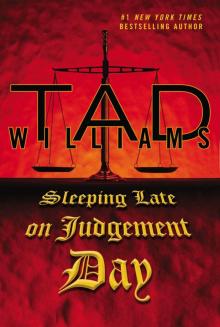 Sleeping Late on Judgement Day
Sleeping Late on Judgement Day Stone of Farewell
Stone of Farewell The Dragonbone Chair
The Dragonbone Chair Sea of Silver Light
Sea of Silver Light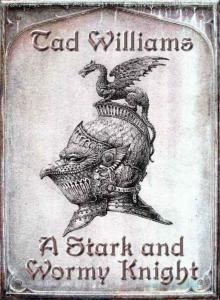 A Stark and Wormy Knight
A Stark and Wormy Knight The Heart of What Was Lost
The Heart of What Was Lost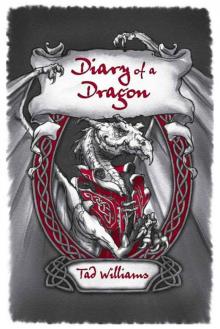 Diary of a Dragon
Diary of a Dragon Last King of Osten Ard 02 - Empire of Grass
Last King of Osten Ard 02 - Empire of Grass To Green Angel Tower, Volume 1
To Green Angel Tower, Volume 1 The Dirty Streets of Heaven
The Dirty Streets of Heaven River of Blue Fire
River of Blue Fire The Very Best of Tad Williams
The Very Best of Tad Williams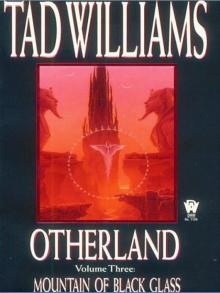 Mountain of Black Glass
Mountain of Black Glass Empire of Grass
Empire of Grass City of Golden Shadow
City of Golden Shadow Happy Hour in Hell
Happy Hour in Hell Shadowrise
Shadowrise Shadowmarch
Shadowmarch Brothers of the Wind
Brothers of the Wind Shadowheart
Shadowheart Bobby Dollar 02 - Happy Hour In Hell
Bobby Dollar 02 - Happy Hour In Hell The War of the Flowers
The War of the Flowers The Dirty Streets of Heaven bd-1
The Dirty Streets of Heaven bd-1 Tad Williams - The War of the Flowers (retail) (pdf)
Tad Williams - The War of the Flowers (retail) (pdf) Shadowheart s-4
Shadowheart s-4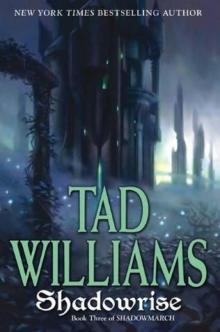 Shadowrise s-3
Shadowrise s-3 The Dirty Streets of Heaven: Volume One of Bobby Dollar
The Dirty Streets of Heaven: Volume One of Bobby Dollar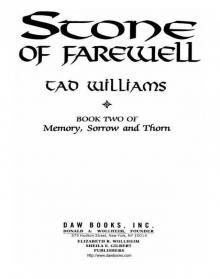 The Stone of Farewell
The Stone of Farewell (Shadowmarch #1) Shadowmarch
(Shadowmarch #1) Shadowmarch The Secrets of Ordinary Farm of-2
The Secrets of Ordinary Farm of-2 Shadowmarch s-1
Shadowmarch s-1![Bobby Dollar [04] God Rest Ye Merry, Gentlepig Read online](http://i1.bookreadfree.com/i1/04/06/bobby_dollar_04_god_rest_ye_merry_gentlepig_preview.jpg) Bobby Dollar [04] God Rest Ye Merry, Gentlepig
Bobby Dollar [04] God Rest Ye Merry, Gentlepig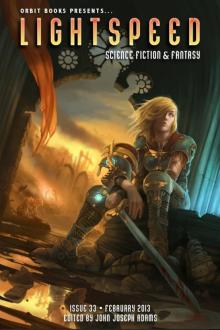 Lightspeed Issue 33
Lightspeed Issue 33 Sea of Silver Light o-4
Sea of Silver Light o-4 The Dragons of Ordinary Farm of-1
The Dragons of Ordinary Farm of-1 Shadowplay s-2
Shadowplay s-2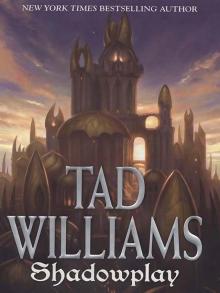 (Shadowmarch #2) Shadowplay
(Shadowmarch #2) Shadowplay